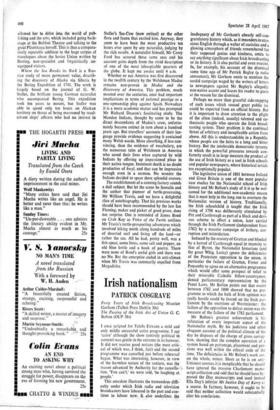Irish nationalism
PATRICK COSGRAVE
Forty Years of Irish Broadcasting Maurice Gorham (Talbot Press Dublin 30s)
The Passing of the Irish Act of Union G. C. Bolton (OUP 38s) I once scripted for Telefis Eireann a mild and only mildly successful satire programme. I say 'satire' although the show (entirely political in content) was gentle in the extreme in its humour. It did not receive good notices (the most criti- cal of which was, I think, fair) and the second programme was cancelled just before rehearsal began. What was interesting, however, in view of the harmless nature of the venture, was the reason advanced by Authority for the cancella- tion. 'You can't,' we were told, 'be laughing at people.'
This anecdote illustrates the tremendous diffi- culty under which Irish radio and television broadcasters have laboured in the past and con- tinue to labour now. It also underlines the
inadequacy of Mr Gorham's obesely self-con- gratulatory history which, as it meanders in atro- cious English through a welter of statistics and a glowing atmosphere of friends remembered for their supposed genius and kindness, omits to say anything significant about Irish broadcasting or its history. It is also partial and even evasive. In, for example, his account of the dismissal some time ago of Mr Patrick Begley (a radio announcer), Mr Gorham omits to mention the sordid campaign waged by the writers of letters to newspapers against Mr Begley's allegedly non-native accent and leaves his reader to guess at the reason for the dismissal.
Perhaps no more than graceful side-stepping of such issues which roused great public ire could be expected from an official history. But it is important to draw attention to the plight of the often (indeed, usually) talented and en- thusiastic people who operate the Irish broad- casting system. Their problem is the continual threat of arbitrary and inexplicable action from above. All this is understandable in a Republic whose people are the heirs to a long and bitter history. But the intolerable democratic tyranny in which the powerful pressures towards con- formity result is in large measure the product of the use of Irish history as a tool in Irish schools and popular newspapers, where historical serials are exceptionally popular.
The legislative union of 1801 between Ireland and Great Britain is one of the most popular case studies for the Nationalist school of Irish history and Mr Bolton's study of it is to be wel- comed for the additional non-academic reason that it must help in the long run to overturn the Nationalist version of history. Traditionally, the Irish schoolchild is taught that the Irish rising of 1798 was deliberately stimulated by Pitt and Castlereagh as part of a black and devi- ous scheme to effect a union, later carried through the Irish Parliament (independent from 1782) by a massive campaign of bribery, cor- ruption and intimidation.
Seduced by the oratory of Grattan and blinded by a hatred of Castlereagh equal in intensity to that of Byron, the Nationalist historians (and the great Whig, Lecky) ignore the deficiencies of the Protestant opposition to the union, in particular the failure of Grattan, Foster and Ponsonby to agree on an alternative programme which would offer some prospect of relief to their miserable Catholic fellow-countrymen, denied parliamentary representation by the Penal Laws. Mr Bolton points out that events between 1782 and 1800 showed that no pro- gramme to which the bulk of Irish opinion was really hostile could be forced on the Irish par- liament by the exertions of Westminster: the failure of the opposition to defeat union was the measure of the failure of the 1782 parliament.
Mr Bolton's greatest achievement is his refutation of every important aspect of the Nationalist myth. By his judicious and often eloquent account of the political climate of the day he disposes of the charge of gross corrup- tion, showing that the complex operation of a system based on patronage, placement and pen- sions was well within the ethical code of the time. The deficiencies in Mr Bolton's work are, on the whole, minor. Short as he is on anti-
Unionist sources, it is inexplicable that he should have ignored the massive Charlemont manu- script collection and odd that he should have by- passed the Day manuscripts and used instead Ella Day's inferior Mr Justice Day of Kerry as a source. In fairness, however, it ought to be said that neither collection would substantially alter his conclusions.






































 Previous page
Previous page